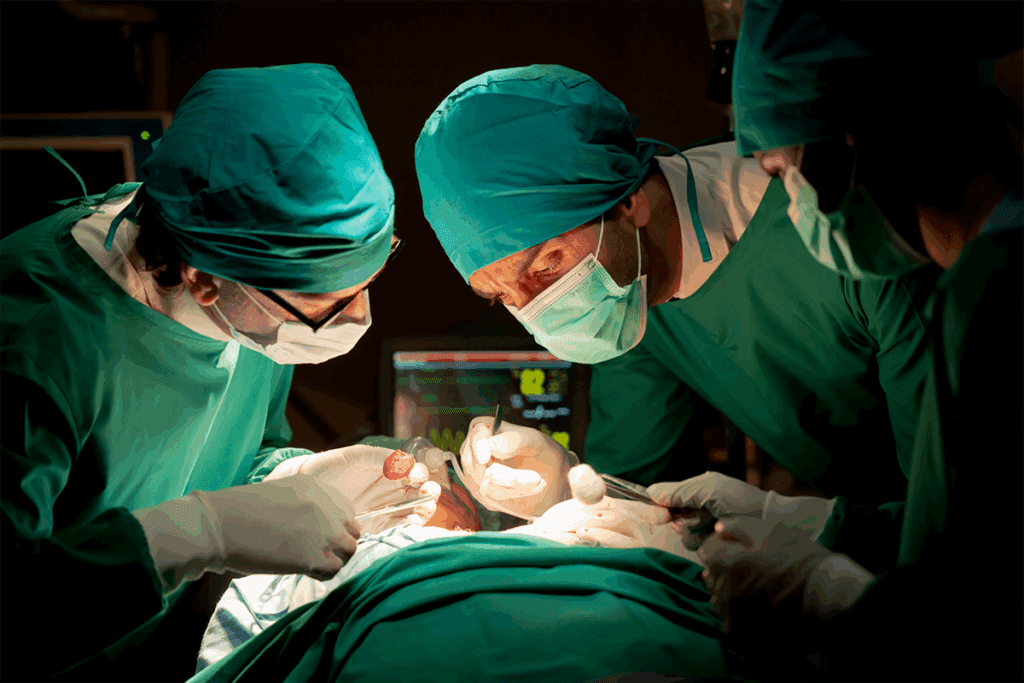
Choosing the right eating plan after gastric sleeve surgery is key to lifelong health and weight control. At Liv Hospital, we stress the need for a balanced diet that controls portions.What is the long term diet after gastric sleeve surgery? Get the best tips on what to eat and calorie goals for lasting success.
We suggest sticking to nutritious, portion-controlled meals that focus on protein. Avoid foods high in calories and sugar. This helps keep you healthy and aids in weight loss, making your gastric sleeve surgery successful.
Key Takeaways
- Prioritize nutritional balance and portion control in your eating plan.
- Focus on consuming high-protein foods.
- Reduce intake of high-calorie, high-sugar foods.
- Ensure lifelong adherence to your eating plan for optimal health.
- Consult with healthcare professionals for personalized guidance.
Understanding Gastric Slee Surgery and Its Impact on Digestion

It’s important to know how gastric sleeve surgery changes digestion to make the right diet choices after surgery. This surgery makes the stomach smaller, turning it into a narrow tube. This change affects how much food you can eat and how your body digests it.
How Gastric Sleeve Alters Your Digestive System
Gastric sleeve surgery changes your digestive system in several ways. It makes your stomach smaller, so you can’t eat as much. This leads to feeling full sooner and eating fewer calories. It also changes how your body makes hunger hormones.
These changes help with weight loss. But they also mean you need to eat differently and pay attention to what you eat.
Why Dietary Changes Are Necessary for Life
After surgery, you’ll need to eat in a new, healthier way. Because your stomach is smaller, you can only eat a little at a time. You should focus on eating foods that are full of nutrients.
Changing your diet for life is key to keeping weight off and staying healthy. You’ll need to eat smaller meals often, avoid foods high in calories or sugar, and make sure you get enough protein.
Differences Between Gastric Sleeve and Gastric Bypass
Gastric sleeve and gastric bypass are both weight loss surgeries. But they work differently and affect your body in different ways.
| Characteristics | Gastric Sleeve | Gastric Bypass |
| Surgical Alteration | Removal of a large portion of the stomach | Creation of a small stomach pouch and rerouting of the intestine |
| Impact on Hormones | Reduces ghrelin production | Alters ghrelin and other hormone levels |
| Nutritional Considerations | Requires careful food choices, high protein intake | May require vitamin and mineral supplements due to malabsorption |
| Reversibility | Generally considered non-reversible | Can be reversed, though complex |
It’s important to know the differences between these surgeries. Each has its own benefits and risks.
The Evolution of Your Diet After Gastric Sleeve Surgery

Gastric sleeve surgery starts a new diet journey. It needs careful planning and sticking to it. As you recover, your diet will change a lot. This helps you smoothly move into your new lifestyle.
First Month Post-Surgery Dietary Progression
The first month after surgery is key to your diet. You start with a liquid diet, then move to pureed foods, and later to soft and solid foods. This helps your stomach heal and gives your body the nutrients it needs.
- Liquid Diet (1-2 weeks post-surgery): Stick to clear liquids like broth, water, and sugar-free gelatin.
- Pureed Foods (2-4 weeks post-surgery): Start with pureed veggies, lean proteins, and soft fruits.
What You Can Eat Two Weeks After Gastric Sleeve
Two weeks after surgery, you’ll move from liquids to soft foods. It’s important to pick foods that are full of nutrients and easy to digest. Some good options include:
- Soft-cooked eggs
- Pureed lean meats
- Mashed veggies
- Soft fruits like bananas or avocados
Transitioning to Regular Foods
By the end of the first month, you’ll start eating more solid foods. This step needs patience and careful addition of new foods. Start with soft foods and then add more variety to your diet.
Key considerations:
- Choose lean proteins and a variety of veggies
- Avoid foods high in sugar and fat
- Eat small, frequent meals
Recommended Calorie Intake After Bariatric Surgery
Knowing how many calories to eat after bariatric surgery is key to losing weight. Patients follow a special diet to get enough nutrients and lose weight.
Initial Calorie Guidelines
At first, patients are told to eat 800-1200 calories a day. This helps with weight loss and lets the stomach heal.
As time goes on, calorie needs can change. It’s important to talk to a healthcare provider or dietitian to find the right amount for you.
Calorie Intake 1 Year After Gastric Bypass
One year after gastric bypass, calorie needs might be different. They depend on age, sex, weight, activity level, and health goals.
Calculating Your Personal Calorie Requirements
To figure out your calorie needs, think about your activity level, weight loss goals, and health. A healthcare provider can help find the right calorie intake for you.
| Time After Surgery | Recommended Calorie Intake | Protein Focus |
| Initial Phase (0-3 months) | 800-1200 calories | High protein intake |
| 1 Year Post-Surgery | Variable, based on individual needs | Maintaining high protein |
| Long-Term | Adjusted based on weight loss goals and activity level | Continued emphasis on protein |
Protein: The Cornerstone of Your Long-Term Diet After Gastric Sleeve Surgery
A diet rich in protein is key for those who have had gastric sleeve surgery. Protein is vital for health and keeping weight off over time.
Daily Protein Requirements
Patients need enough protein to heal and keep muscle after surgery. The daily goal is 60 to 80 grams. But this can change based on age, sex, and how active you are.
High-Quality Protein Sources
It’s important to eat high-quality proteins. These include lean meats, fish, eggs, dairy, and plant-based foods like beans. Protein shakes and supplements are also good, mainly in the early recovery days.
Strategies for Meeting Protein Goals
To hit your protein targets, eat protein at three meals and two snacks. Choose protein-rich foods for every meal. For instance, start with a protein-packed breakfast like eggs or Greek yogurt.
Also, make sure your diet is balanced and full of nutrients. This helps with long-term health and weight loss. Getting advice from a healthcare provider or nutritionist can help tailor your diet to your needs.
Optimal Meal Structure and Portion Control
After gastric sleeve surgery, patients need to change how they eat. They should focus on balanced meals and mindful eating. This helps in losing weight and getting the nutrients the body needs.
The Three-Meal, Two-Snack Approach
Patients eat three small meals and two healthy snacks a day. This method helps manage hunger and avoid eating too much. Meals should have protein, veggies, and whole grains. Snacks should be full of nutrients.
Here’s an example of what a day’s meals could look like:
- Breakfast: Scrambled eggs with spinach and whole-grain toast
- Mid-morning Snack: Greek yogurt with berries
- Lunch: Grilled chicken breast with roasted veggies and quinoa
- Afternoon Snack: Carrot sticks with hummus
- Dinner: Baked salmon with sweet potato and green beans
Appropriate Portion Sizes
Knowing and sticking to the right portion sizes is key to portion control. After surgery, the stomach is much smaller. Eating too much can cause discomfort and problems.
| Meal | Recommended Portion Size |
| Breakfast | 1/2 cup to 1 cup |
| Lunch | 1/2 cup to 1 cup |
| Dinner | 1/2 cup to 1 cup |
| Snacks | 1/4 cup to 1/2 cup |
Mindful Eating Techniques
Practicing mindful eating is important. It helps you know when you’re hungry or full. This means eating slowly, enjoying your food, and stopping when you’re just satisfied.
“The key to mindful eating is paying full attention to the experience of eating and drinking, both physically and emotionally.” – Jan Chozen Bays.
By using these techniques every day, patients can have a better relationship with food. This helps them keep their weight loss over time.
Foods to Embrace in Your Post-Bariatric Lifestyle
Choosing the right foods is essential for a successful post-bariatric lifestyle. After gastric sleeve surgery, your diet is key to your health and weight loss. We suggest eating nutrient-dense foods that give you the vitamins, minerals, and proteins you need.
Nutrient-Dense Food Choices
Nutrient-dense foods are packed with nutrients but low in calories. Good examples are lean proteins like chicken, fish, and eggs. Also, include a variety of vegetables and fruits in your diet. This helps you get the nutrients you need without too many calories.
Fiber-Rich Options for Digestive Health
Fiber-rich foods are important for good digestive health after bariatric surgery. Foods like whole grains, legumes, and some fruits and vegetables are high in fiber. They help prevent constipation and support your gut health. As one expert says, “A high-fiber diet is essential for maintaining a healthy digestive system.”
Hydration Guidelines
Drinking enough water is also key after bariatric surgery. We advise drinking at least 64 ounces of water daily, more if you’re active. Avoid drinking during meals and sip slowly to prevent discomfort.
By eating nutrient-dense foods, fiber-rich options, and staying hydrated, you support your health. This helps you keep the benefits of your gastric sleeve surgery.
Foods and Eating Habits to Avoid Long-Term
Success after gastric sleeve surgery depends on avoiding certain foods and habits. We suggest a healthy, balanced diet to support your weight loss and well-being.
High-Sugar and High-Fat Foods
Staying away from high-sugar and high-fat foods is key. These foods are full of calories but lack nutrients. Avoid sugary drinks, desserts, and processed snacks.
Empty Calories and Processed Foods
Empty calories in processed foods can harm your health. They often have added sugars, unhealthy fats, and sodium. Try to limit or avoid chips, fried foods, and baked goods.
Problematic Eating Behaviors
It’s also important to avoid problematic eating behaviors. This includes eating too fast, not chewing well, and grazing all day. Mindful eating can help you have a better relationship with food.
By watching your diet and avoiding high-sugar foods, high-fat foods, empty calories, and problematic eating behaviors, you can maintain your weight loss. We’re here to support you every step of the way.
Post-Bariatric Surgery Meal Planning
Creating a personalized meal plan is vital after bariatric surgery. It helps patients eat a balanced diet. This ensures they get all the nutrients they need for good health.
Sample Meal Plans for Different Stages
Patients go through different dietary stages after gastric sleeve surgery. Sample meal plans guide them through these stages. They show what to eat and how to organize meals.
In the early stages, patients might start with a liquid diet. Then, they move to pureed foods and eventually solid foods. Here’s a simple example of a meal plan:
- Liquid diet: Broth, protein shakes, and clear soups
- Pureed diet: Mashed vegetables, pureed meats, and soft fruits
- Solid foods: Lean proteins, vegetables, and whole grains
Quick and Nutritious Recipe Ideas
Quick and nutritious recipe ideas help patients make healthy meals. Some ideas include:
- Grilled chicken with roasted vegetables
- Protein smoothies with spinach and berries
- Salads with lean proteins and nuts
Eating Out After Gastric Sleeve Surgery
Eating out can be tough after gastric sleeve surgery. But with planning, patients can make healthy choices. When eating out, focus on lean proteins, vegetables, and whole grains.
Remember to watch portion sizes and avoid high-calorie or high-fat foods. Making smart choices lets patients enjoy dining out while staying healthy.
Managing Your Long-Term Diet After Gastric Sleeve Surgery
After gastric sleeve surgery, it’s key to manage your diet for lasting weight loss and health. As you move through the recovery stages, your diet needs to change. You’ll need to keep adjusting to stay healthy.
2 Years Post-Op Gastric Sleeve Diet Considerations
Two years after surgery, you’ve likely lost a lot of weight and feel better. But it’s important to keep watching your diet. Aim for a diet full of protein, vitamins, and minerals. Also, be careful not to eat too much to avoid stretching your stomach and gaining weight back.
3 Years Post-Op Gastric Sleeve Diet Maintenance
By the third year, you’ve likely reached a stable weight. But you must stay careful with your diet. Eat a variety of foods that are good for you. Regular check-ups with your doctor can catch any diet problems early.
Preventing Stomach Stretching and Weight Regain
To stop your stomach from stretching and to avoid gaining weight, pay attention to your portions. Eat smaller meals often, avoid foods high in calories, and drink plenty of water. Here are some tips for keeping your diet on track:
| Dietary Strategy | Benefits |
| Eating smaller, frequent meals | Reduces strain on the stomach, helps maintain weight loss |
| Avoiding high-calorie, high-fat foods | Supports weight loss, reduces the risk of nutritional deficiencies |
| Staying hydrated | Helps control hunger, supports overall health |
By choosing healthy foods, you can keep the benefits of gastric sleeve surgery going. This way, you can live a balanced and healthy life for years to come.
Conclusion: Sustaining Success After Gastric Sleeve Surgery
Success after gastric sleeve surgery means making healthy choices for life. A good diet is key to keeping weight off and staying healthy. This article has shown how important a long-term diet plan is.
Eating foods rich in nutrients and controlling portions helps a lot. Drinking plenty of water is also important. These habits help you lose weight and feel better.
Keeping weight off after surgery takes hard work and commitment. We urge everyone to keep their health goals in mind. Getting help from doctors and support groups can make a big difference. This way, you can keep losing weight and live a happier, healthier life.
FAQ
What can I eat two weeks after gastric sleeve surgery?
After two weeks, you can start with soft or puréed foods. Think scrambled eggs, cottage cheese, and cooked veggies. Always follow your doctor’s diet plan.
How many calories do bariatric patients eat long-term after surgery?
Calorie needs vary based on age, sex, weight, and activity. Most eat 800 to 1500 calories daily. Focus on nutrient-rich foods.
What is the long-term diet after gastric sleeve surgery?
The diet focuses on protein, veggies, fruits, and whole grains. Avoid high-calorie, high-fat, and sugary foods. A balanced diet is key.
How do I calculate my personal calorie requirements after bariatric surgery?
Your doctor or dietitian will figure out your calorie needs. They consider your weight loss goals and health.
What are the daily protein requirements after gastric sleeve surgery?
Aim for 60-80 grams of protein daily. Eat lean meats, fish, eggs, and dairy to meet this goal.
How can I prevent stomach stretching and weight regain after gastric sleeve surgery?
Eat healthily, eat mindfully, and follow your doctor’s advice. Regular check-ups are also important.
What foods should I avoid long-term after bariatric surgery?
Avoid high-sugar, high-fat, and processed foods. Also, steer clear of carbonated drinks and foods that upset your stomach.
Can I eat out after gastric sleeve surgery?
Yes, but choose wisely. Opt for nutrient-rich foods, control portions, and avoid high-calorie or fatty foods.
What is the recommended meal structure after bariatric surgery?
Eat three main meals and two snacks daily. Focus on balanced foods, mindful eating, and portion control.
How do I manage my diet 2-3 years after gastric sleeve surgery?
Keep eating a balanced diet and maintain a healthy weight. Regular health check-ups are vital.
Reference:
Bettini, S., Sibilio, G., Campana, R., & Zamboni, M. (2020). Diet approach before and after bariatric surgery. Nutrients, 12(2), 321.https://pmc.ncbi.nlm.nih.gov/articles/PMC7455579



































